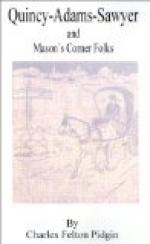As he spoke he looked at the woman seated at the table. She looked up; there was an instantaneous, mutual recognition. In her astonishment she cried out, “Mr. Sawyer!”
As these words fell from her lips, Quincy said to himself, “Thank God! she’s found at last.” But the only words that he spoke aloud were, “Lindy Putnam!”
“Why do I find you here,” asked Quincy, “and under this name? Why have you not answered my advertisements in the ‘Herald?’” And he sank into a chair on the other side of the little table.
The revulsion of feeling was so great at his double discovery that he came nearer being unmanned than ever before in his life.
“How did you come by this card!” asked Mademoiselle Archimbault in a broken voice. “When you have explained, I will answer your questions.”
Quincy took the card from her hand and glanced at it. “What a big blunder I made and yet what a fortunate one,” cried he, for he now saw that he had sent in Lord Hastings’s card bearing the London address. “Lord Hastings himself gave it to me,” he continued. “He was a guest at my father’s cottage at Nahant last summer. He came to America and spent three months vainly searching for you. He loves you devotedly, and made me promise that if I ever found you I would cable at once to the address on that card, and he said he would come to America on the next steamer. Of course when I made that promise I did not know that Lindy Putnam and Celeste Archimbault were one and the same person.”
“But knowing it as you now do, Mr. Sawyer, you will not send him any word. Give me your solemn promise you will not. I cannot marry him. You know I cannot. There is no Lindy Putnam, and Celeste Archimbault has no right to the name she bears.”
“Did you come to New York when you left Eastborough, as you promised you would?” inquired Quincy.
“No, I did not, Mr. Sawyer,” said she. “Forgive me, but I could not. I was distracted, almost heartbroken when I reached Boston the day she died. She had robbed me of all hope of ever finding my relatives, and but for my hatred of her I believe I would have had brain fever. One thing I could not do, I would not do. I would not remain in America. I was rich, I would travel and try to drown my sorrow and my hatred. I did not go to a hotel, for I did not wish any one to find me. What good could it do? I looked in the ‘Transcript’ and found a boarding place. There I met Mdme. Archimbault, a widow, a French-Canadian lady, who had come to Boston in search of a niece who had left her home in Canada some five years before. Mdme. Archimbault had spent all the money she had in her unavailing search for her relative, and she told me, with tears in her eyes and expressive French gestures, that she would have to sell her jewelry to pay her board, as she had no way of making a living in a foreign land. Then I told her part of my story. She was sure her niece was dead, and so I asked her to




